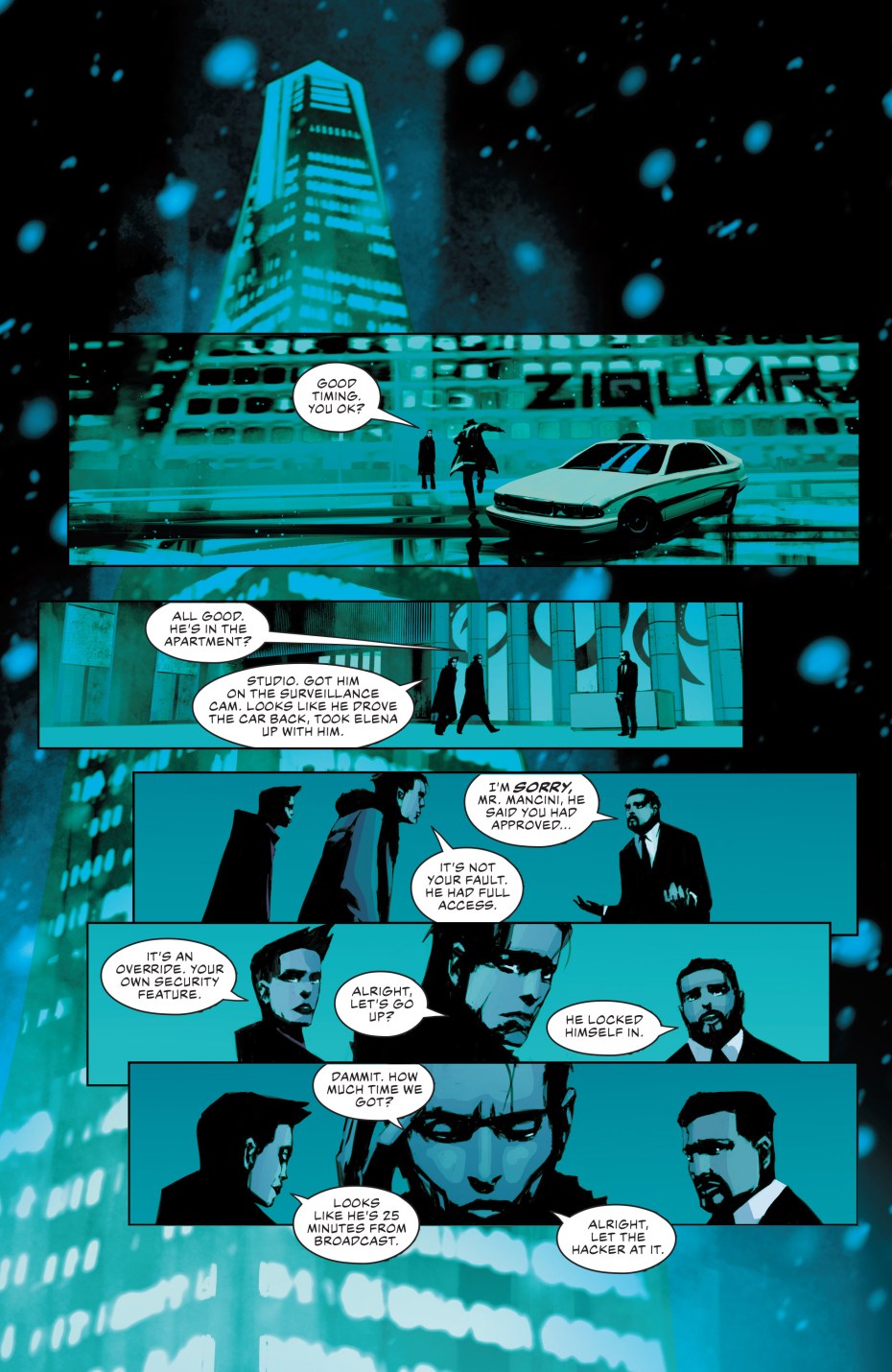Writer Scott Hoffman has just released his first comic book, Nostalgia, a stunning new cyberpunk story with gorgeous, moody digital painting by artist Danijel Žeželj.
Here's the official brief synopsis:
A reclusive rock star receives a mysterious package that forces him to face both his past and a resistance movement that represents all of the ideals he had once stood for.
Simple enough, right? And certainly, Hoffman knows what it's like to be a radical rockstar, having his made his mark on the world as a founding member and multi-instrumentalist for the queercore glam pop band known as Scissor Sisters, under the stage name of BabyDaddy. Since then, he's worked with musical artists such as Kylie Minogue and the Pet Shop Boys.
Which is not to say that the comic book is autographical by any stretch. But Hoffman still brings a real world sensibility to his futuristic landscape. Each issue begins with an excerpt from a piece of music journalism, responding to the heyday of the eponymous reclusive rockstar, Nostalgia (also known as Craig). Craig found a lot of success in a short time, thanks to his musical instrument of choice — a curious orb, created by his longtime collaborator, Elena, which essentially allows him to literally tap into his own memories, and transmute those memories into electronic music.
We don't exactly get to hear what the music sounds like, but artist Žeželj does an incredible job at evoking the feeling of Nostalgia's bio-organic electrobeats. The moody artwork shifts seamlessly from that atmospheric surreality into noir-ish storytelling as the central plotlines pickup, and the reclusive Nostalgia has to deal with an unexpected young companion who is disappointed in the failures of the revolutions promised by the older generation.
Nostalgia has been released serially over the past 5 weeks through ComiXology Originals, with the final chapter out this coming Tuesday. But if you'd told me it was published somewhere between the late-80s and mid-90s, I would absolutely believe you. Consider that a testament to the work that Hoffman and Žeželj have done here. In an interview with GamesRadar, Hoffman even acknowledged that he was trying to invoke the nostalgia of the feelings he got when he first discovered books like Transmetropolitan, Judge Dredd: America, Shade: The Changing Man, and Dean Motter's Mister X. And to their credit, Hoffman and Žeželj absolutely nail that early Vertigo aesthetic.
But the main way that Nostalgia differs from those early 90s comics is that it lacks the same of radical subversion. There are no subtle attempts to inject queer representation or radical leftist politics into the narrative like you'd find in a lot of Vertigo-adjacent books, because a lot of those political issues have since become mainstreamed. But how much has actually changed in that time? That's a central theme of Nostalgia. The story explores legacy, in all its forms, but especially in the promises of a radical revolution that never quite came to pass. One where the aesthetic qualities were assimilated into the capitalist structure, thanks to the mass media innovations of seemingly well-intentioned billionaires. They're being totally genuine when they tell you that they want to help you get the message out. They love the message — but only inasmuch as they can appropriate it, data mine it, and sell it all back to you for profit.
This is both one of the greatest strengths of Nostalgia, and one of its primary weaknesses. Hoffman and Žeželj do an incredible job filling in the edges of this near-future cyberpunk hellscape they've created. Nostalgia and his extended relations are all wonderfully, subtly drawn characters. They're distinct and believable people without any cartoonish bombast or other witty writerly shortcuts. But the revolution of the past is sort of vague, as are the demands of the next generation of radical hopefuls who threaten to upend Nostalgia's peaceful retirement. They issue vaguely generic proclamations about freedom, and authority, and money, and elites, and the empty promises of brighter futures they raised on as idealistic youth. It's a sort of perfect amalgamation of cyberpunk worlds — and yet it doesn't say anything specific.
In some ways, that might be the point of the story. Just like those early Vertigo-era stories were commenting on specific current events, maybe Nostalgia is really about the current malaise of late-stage capitalist ennui, where everything's been ironized, satirized, and revolutionized until it's all become one with the machine.
I don't know. But either way, Nostalgia is a beautiful, thought-provoking throwback to that era of storytelling, that leaves you with a lot of questions and even more feelings. If you don't believe me, just check out these preview pages for yourself:











